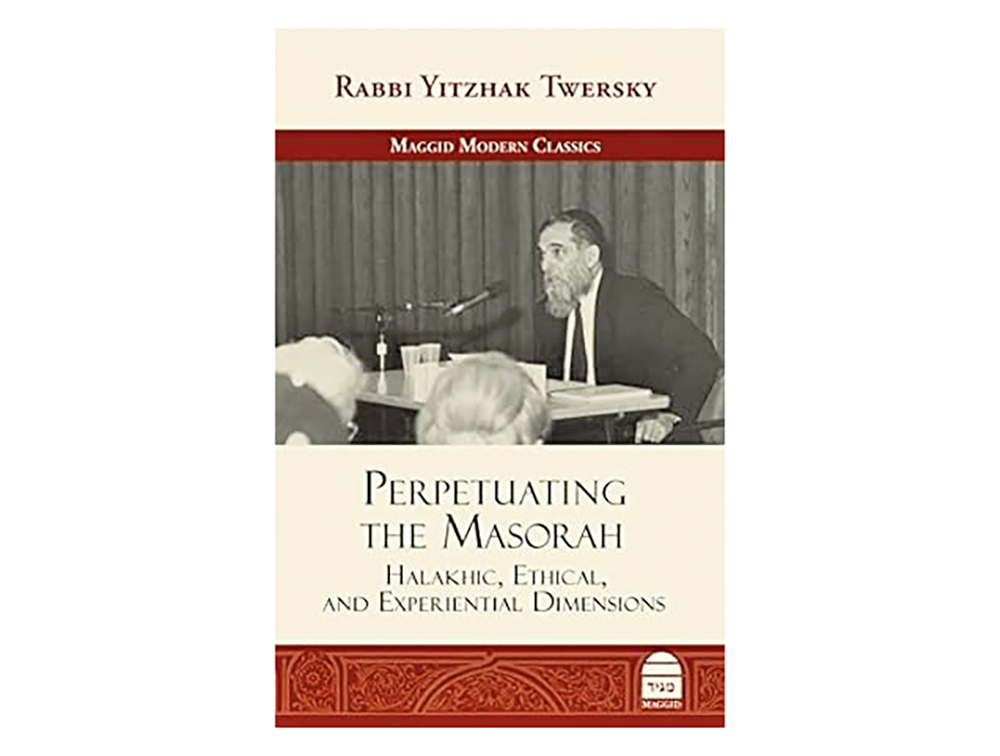
Reviewing: “Perpetuating the Masorah: Halakhic, Ethical and Experiential Dimensions” by Yitzhak Twersky. Maggid Books. English. Hardcover. 188 pages. ISBN-13: 978-1592646043.
The “Maggid Modern Classics” from Koren Publications is a series with titles from many great Jewish thinkers. From Rav Avraham Isaac Kook to Rav Yosef Soloveitchik and others, there are currently 13 titles in the series to keep you intellectually stimulated.
Two recent titles are particularly noteworthy as both of the authors are cut from the same cloth. These are “Perpetuating the Masorah: Halakhic, Ethical and Experiential Dimensions” by Rabbi Yitzhak Twersky and “Pathways to Their Hearts: Torah Perspectives on the Individual” by Rabbi Nachum Rabinovitch.
What’s unique about Twersky and Rabinovitch is their complete mastery and integration of the Torah. There are stories of people who mastered the Talmud such that they could pass the “pin test.” This is where you could stick a pin in one word on a page of Talmud and the person could tell you what is on the other side of the page, continuing until the end.
While memory mastery of the Talmud is a goal one should aspire to, that’s also something that has been achieved by Google and Sefaria. But seeing all Talmudic texts as a single integrated unit, making myriad connections and elucidating insights from them, is something far beyond what Google can ever do, and is limited to rare scholars. Of which Twersky and Rabinovitch fall into that singular category.
Both of them were uncompromising in their intellectual honesty and eschewed a simplistic approach to Torah. The outcome is essays with deep scholarly sophistication that are amazingly stimulating.
“Pathways to Their Hearts” contains nine essays originally written in Hebrew. They have been masterfully translated by Rabbi Elli Fischer and bring the brilliant insights of Rabinovitch to the English-speaking reader. Rabinovitch was the rosh yeshiva of Yeshivat Hesder Birkat Moshe in Ma’ale Adumim from 1980 until his death in 2020. He sadly is not well-known in American circles, which is a loss for American audiences.
Rabinovitch is best known for his set of seforim “Yad Peshutah,” which Allan Nadler calls
“the most systematic, comprehensive commentary on Maimonides’s code ever produced.” The more than 20 volumes of “Yad Peshutah” show that Maimonides was a remarkably consistent thinker whose halakhic positions in the Mishneh Torah were meticulously coordinated with his philosophical reasoning.
Rabinovitch was often portrayed as being liberal when it came to social and religious issues. This is often in contrast with the status quo which seems to strive for halachic stringencies, even when they are not warranted.
In the chapter on rabbinic leadership, he writes that a spiritual leadership that views its role as merely maintaining the status quo and is content with the community not veering to the right or left, is guilty of perpetuating present social ills and keeping those at the margins of society where they are, and also fails to understand reality. Leaders must know how to address constantly changing conditions and how to guide the community in the face of new developments. That is sage advice indeed.
Every chapter here is a gem. And the finest of these gems is the chapter on “Torah and Science — Conflict or Complement? Rabinovitch was a master of the sciences, having written his doctoral dissertation on “Probability and Statistical Inference in Ancient and Medieval Jewish Literature.”
Rabinovitch was the consummate rationalist and pragmatist and writes that the economic security of a society is inconceivable without the cultivation of science and technology. But if Torah and science are two separate realms, and impossible to reconcile, then we would have to admit that Israel’s future is in jeopardy, for then there is no hope of building an advanced, productive and economically robust society that will fulfill and realize the vision of God’s kingdom on earth.
Rabbi Yitzhak Twersky, the son-in-law of Rav Yosef Soloveitchik, was a professor of Hebrew literature and philosophy at Harvard University for over 40 years until his untimely death in 1997. Four of the five chapters in this volume are about the oral tradition, the masorah, its development and its relevance. These challenges, akin to what Rabbi Shmuel Phillips expands on in detail in his recent “Talmud Reclaimed” (Mosaica Press), is how Judaism deals with ancient formulas and axioms and applies them to the modern world, in a relevant and meaningful manner.
The essays here were adapted from speeches given by Yitzhak Twersky by his students Dr. Carmi Horowitz and Rabbi David Shapiro. The essays take what initially may be considered a one-dimensional idea, such as making a fence around the Torah, and show how Twersky expanded on these ideas. He shows how they are Talmudic axioms and inextricably linked to the mesorah.
The final chapter contains numerous insightful vignettes about his father-in-law Rav Soloveitchik. These are particularly insightful, as not only was Yitzhak Twersky family, such that he could have these intimate insights, but he was also a Talmudic genius who could truly understand and fully appreciate the Rav’s greatness.
Rabbis Twersky and Rabinovitch were two rare individuals, unique in their generation, leaving a distinctive intellectual legacy. Both of these fascinating books ensure that their legacies live on.
Ben Rothke lives in New Jersey and works in the information security field. He reviews books on religion, technology, philosophy and science. Follow him on Twitter at @benrothke. He just published “The Definitive Guide to PCI DSS Version 4: Documentation, Compliance, and Management”









